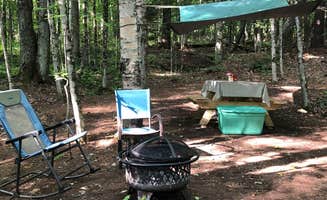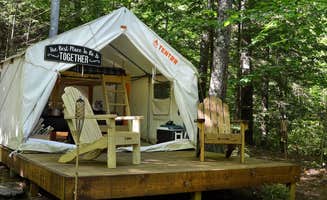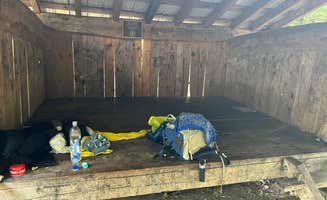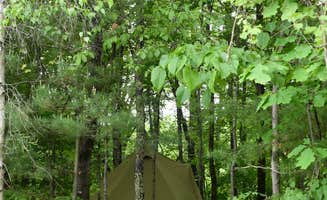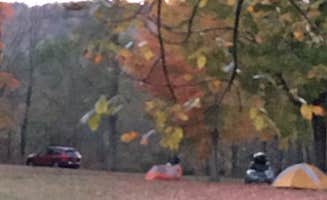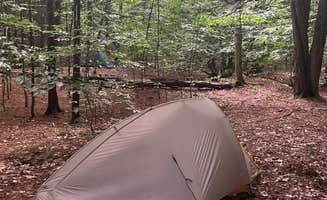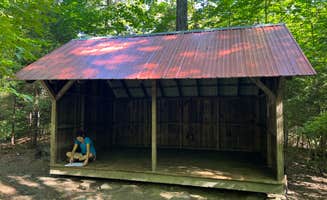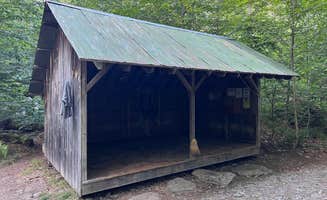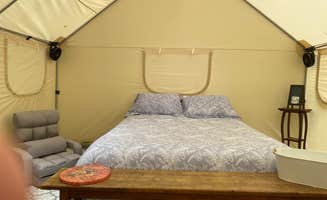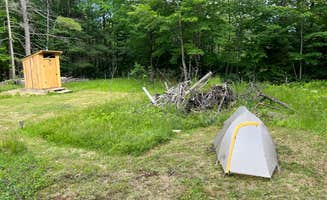Tent camping near Elkins, New Hampshire offers diverse experiences within White Mountain National Forest, with elevations ranging from 700 to 4,000 feet throughout the region. Summer temperatures typically range from 50-80°F with higher precipitation in spring months. The area encompasses multiple ecosystems including northern hardwood forests, spruce-fir zones, and river valleys that provide varied camping environments.
What to do
Climbing adventures: Baker Rocks provides an excellent base camp for rock climbing enthusiasts. "I tent camped here while doing some fishing in the area," notes Justin P. The proximity to climbing spots makes it convenient for those looking to explore vertical terrain.
Hiking preparation: The AAC Rattlesnake Campground serves as an ideal starting point for hikers and climbers. Les R. explains, "I started climbing at Rumney about a decade before this campground was developed, and man, were we overdue for one!" This American Alpine Club site primarily attracts rock climbers preparing for nearby routes.
Water activities: Many campsites are situated near rivers and streams suitable for fishing and wading. Some campers report catching small fish in the Baker River, though success varies by season and water levels. The shallow waters near some campsites are suitable for children to explore during summer months.
What campers like
Private wooded sites: Baker Rocks earns praise for its secluded tent platforms. "The tent sites are within the wooded area around the property and felt very secluded," writes Justin P., adding that "the site had a large tent platform they could fit multiple tents, a brand new picnic table, a fire ring (with a free bundle of firewood)."
Unique glamping options: Beyond traditional tent camping, several locations offer alternative accommodations. April W. reports about Baker Rocks: "We stayed 2 nights in the double bell tent with two clean full size beds and a 3rd night in the yurt both were spacious and wonderful, among tall trees and pines."
Property amenities: Some campgrounds feature unexpected extras that enhance the camping experience. At Lost Boys Hideout, Steve K. notes "Improvements to the firepit, area all mulched, even some games and water are provided!" Campers consistently mention appreciating these thoughtful touches that differentiate sites from basic backcountry camping.
What you should know
Water availability: When hiking to backcountry shelters, reliable water sources can be an issue, especially during dry periods. Justin P. reports about Velvet Rocks Shelter: "The water source here was dry during my trip which was expected during the drought (August 2022)." Campers should plan to carry extra water or confirm seasonal availability.
Variable site quality: Tent spots at backcountry locations can have limitations. At Trapper John Backcountry Campground, "There were a few spots for tenting but not a lot," and "There was no view or other point of interest here, though a bit further up the trail there were good views at Holt's Ledge."
Noise factors: Despite feeling secluded, some campgrounds experience noise from nearby roads. Tent campers at Baker Rocks mention "a bit of road noise overnight" despite the wooded surroundings. Weather conditions and weekend timing can also impact noise levels at more popular sites.
Tips for camping with families
Animal encounters: Some campgrounds feature domestic animals that children enjoy. April W. mentions at Baker Rocks, "They even have animals to visit like bunnies and goats (far away from the campsites)." These interactions provide additional entertainment for younger campers.
Bug preparation: Insects can be problematic in wooded areas, particularly in early summer. "Do bring bug spray, the mosquitoes at certain times of day were aggressive, as to be expected," advises April W. Families should pack insect repellent and consider mosquito netting for tent entrances.
Beach access: River beaches provide natural play areas for children. Multiple campgrounds feature access to shallow water areas where kids can wade safely during warmer months. Parents appreciate these natural water features as alternatives to swimming pools.
Tips from RVers
Limited hookup options: Most campgrounds near Elkins focus primarily on tent camping with few RV-specific amenities. While some locations like Sunapee State Park Campground offer electric, water, and sewer connections, most sites in the immediate Elkins area are better suited for smaller campers or vans without hookup requirements.
Alternative shelters: For RVers wanting a break from their vehicles, Cardigan Campsites provides tent-only options. Madison G. notes it's a "Great spot to spend the night before a climb of Mt. Cardigan! Or after! The climb is challenging but shouldn't take too long."
Site accessibility: Many forest road approaches to campgrounds have limited turn-around space for larger vehicles. RVers frequently mention challenges with site access, particularly after rain when unpaved roads can become muddy and rutted. Checking ahead about access conditions is recommended.


